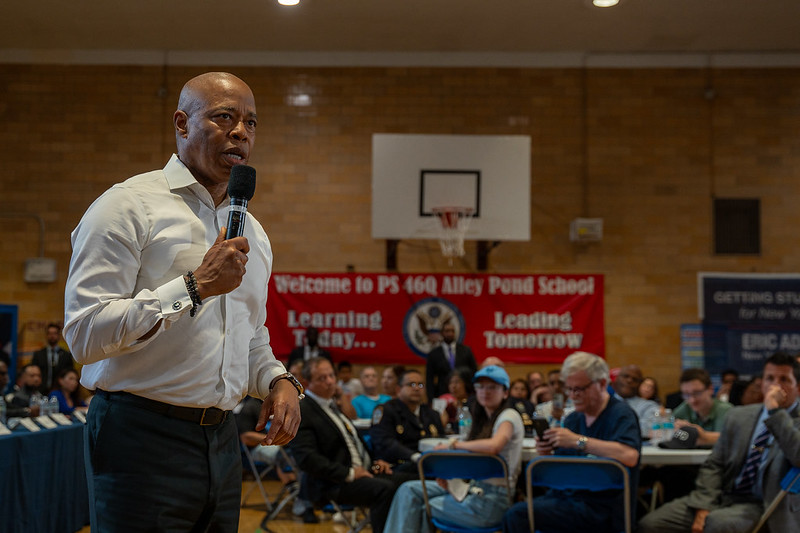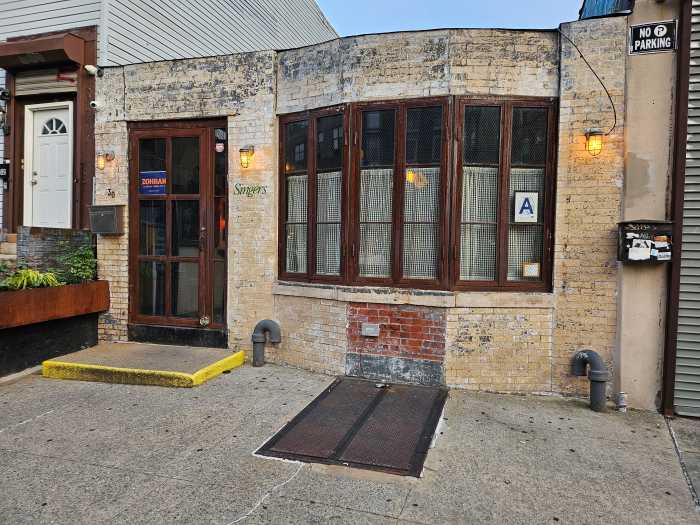BY TRAV S.D. | (travsd.wordpress.com) | One of the strongest links bridging the contemporary Downtown arts world with its avant-garde heyday of the late 1960s is the continued presence of performance art legend Penny Arcade.

She was still a teenager when she moved to New York and had the good fortune to be immediately embraced by John Vaccaro and his Playhouse of the Ridiculous, which led to working with Jackie Curtis at La MaMa, which led to the Andy Warhol-Paul Morrisey film “Women in Revolt” (1971), in which she shares the screen with Curtis and fellow drag legends Candy Darling and Holly Woodlawn. After this, she spent a decade in Europe, returning to New York just in time for the explosion in performance art just then getting under way. Through the ’80s she worked with the likes of Jack Smith, Charles Ludlam and Quentin Crisp, and began to develop her first solo work. She was to become best known for her 1990 piece “Bitch! Dyke! Faghag! Whore!” which mixed elements of monologue, comedy improv and erotic dancing, and which she has toured all over the world.
Now with 30 years of being a solo performance star under her belt, she is developing a new show called “Longing Lasts Longer” which is being presented at Joe’s Pub on Mondays, through June 8.
It’s all about change and gentrification in the town Arcade refers to as “The Big Cupcake.”
“It used to be the Big Apple,” she says, “and the apple has always represented the fruit of knowledge. But New York has changed in the past 20 years. It was the city that never sleeps. Now it’s the city that can’t wake up. It’s in a sugar coma. People are careening from one cupcake shot to another.”
The “knowledge” she refers to is New York’s famously rich, vibrant, multi-ethnic culture which seems to be rapidly disappearing.
“I’ve lived here almost 50 years. I watched people much older than me and now I’m much older than a lot of people, and I see a world that I once knew becoming homogenized. The people who are coming here now are changing it. There has always been a deep resentment in the rest of America about how New York was different. Giuliani sold New York to the rest of America as the same, and so we’ve had all this free market capitalist destruction. Developers are destroyers. They’re not developing anything here, they’re destroyers. So I thought I needed to make a show with my point of view. I could express what I see happening.”
“People say New York has ALWAYS changed,” she says, “but historically it had always brought the past with it. We are now into the first generation where that remarkable tapestry that has influenced the rest of country and the rest of world is being cut off. What the blacks brought, what the Italians brought, what the Chinese brought, the German beer halls, the beatnik coffee houses, the hippie head shops, all these different cultures. Each new generation had access to these things and internalized these histories and moved forward and now we are at the end of history and people are coming to New York not because they want to be like New York, but because they want New York to be like them. They hate history, but love ‘vintage.’ It used to be you would leave your hometown and give up comfort and come to New York for its urbanity. It was anonymous. You’d have a relationship with the city itself the streets. Now, it’s becoming suburban. Take walking down the street. People in New York used to have their own choreography. People bump into you now and have conversations at the top of the subway steps. They are not used to having to live with people.”
“People keep talking about the problem of high rents. But there is gentrification of ideas as well as of buildings. The whole sense of community that characterized the counterculture has been eroded away. ‘Longing Lasts Longer’ is a standing up for that. There is so much isolation now. The Internet is not fulfilling its promise the way the old community spirit of Downtown New York used to. It separates people more and more. It erases the sense of city space.”

But at the same time, claims Arcade, New Yorkers (including its artists) are allowing political correctness to stifle their famous individualism.
“Traditionally, New York people formed their own opinions. Most came from somewhere else because we needed to follow our own star. We don’t want to be told anything. We’re interested in your opinion as long as we can have our own opinion. The problem with political correctness is that it’s a consensus activity. Human beings are herd animals biologically. We need to be with other people. This can be acted out in two ways: being part of a crowd or being part of pack. The crowd operates by consensus: you have to agree with everyone in crowd. But a pack is a group of individuals, it operates by expansion. You don’t need to agree but you’re allowed to expand. You can’t have your own opinion among people who traffic in political correctness. You have to agree. Political correctness hijacks the conversation.”
This is a drum that Arcade has been beating for quite a while now.
“My 2002 show ‘New York Values’ was about ‘the New York you miss’ or ‘the New York you missed.’ The person who reviewed it for Time Out New York was very annoyed by it. They claimed I was saying that anyone who’s not a starving artist is uncool. It’s never been that. Bohemianism has always been a set of values. It’s never been about being poor. It’s about what your values are.”
“Longing Lasts Longer,” says Arcade, “is not a swan song but more of a call to action. We need to restore our own personal authenticity. The only thing that is constant in our life is change,” she says, “and the thing that lasts longest is longing. Anyone of a certain age who complains of the way things are today is accused of nostalgia, but longing is different from nostalgia. It is a yearning not only for the past but who you were in the past. Longing attaches to our values, to our desire. It’s not tied to our time and place. We’re longing for the future. We’re living in a culture that’s so ageist that if you’re over 50 you’re really not allowed to have an opinion on the present. But I like that my whole 48 years of performing comes into play onstage. Art is one of the few things in life where you get better as you get older. The media keeps telling people that aging is some kind of failure, that the last 40 years of your life are inferior. People are buying into that. People in their early 30s, people are panicking. I want this show to be a vindication for people over 50, inspiration for people under 50.”
“Longing Lasts Longer” is performed at 7 p.m. on May 25, June 1 and 8 at Joe’s Pub (425 Lafayette St. btw. Astor Pl. and E. Fourth St.). For tickets ($20), visit publictheater.org. For artist info, visit pennyarcade.tv.


































